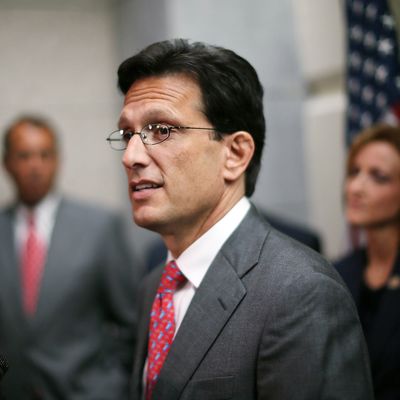
In an interview with the Wall Street Journal’s Gerry Seib, Eric Cantor gives a status update on the forthcoming Republican health-care plan. Last month, he announced, to much fanfare, that House Republicans would stop endlessly carping on Obamacare’s flaws and rally around an alternative plan of their own. Cantor’s original promise, from January 30, had the ringing certainty of Jack Kennedy vowing to reach the moon by the end of the 1960s:
“This year, we will rally around an alternative to ObamaCare and pass it on the floor of the House.”
On February 21, Cantor was asked how the health-care plan is going. It’s going! Almost done:
“As we continue to work to finalize our Obamacare replacement plan, we will also act to highlight and address the serious consequences of the law …”
They’re just dotting some is and crossing some ts. Also, by the way, they’re going to be spending a lot of time highlighting Obamacare’s flaws.
Yesterday’s Roll Call gave a less optimistic update on the state of the plan:
House Republican leaders will meet Friday to begin crafting an alternative to Democrats’ health care law …
That task will fall to Cantor and his top committee chairmen, who will gather the party’s best ideas, build support in their respective committees and craft consensus among the conference writ large
Wait, begin? Gather ideas? I thought you said it was almost done!
In today’s interview with Seib, Cantor is no longer talking about “finalizing” the Republican plan. And he’s no longer using terms like will. Seib does not call attention to the softening of Cantor’s promise, but the retreat is noticeable. Paragraph four of Seib’s story features this quote:
“Our members are going to get very excited if we can provide alternatives, not just be a party that’s against whatever the president is for,” Mr. Cantor, the House majority leader, said in an interview. “It doesn’t mean we’re not going to prosecute the case against the president’s agenda in the form of a public debate.”
If we can provide alternatives?
And then when we get to paragraph ten, we encounter this little walk-back:
“We may have an opportunity for an alternative to be put in place.”
May?

Lots of people treat the Republican Party’s inability to unify around an alternative health-care plan, four years after the passage of the Affordable Care Act, as some kind of homework assignment they keep procrastinating on. But the problem isn’t that Cantor and Boehner and Ryan would rather lay around on the sofa drinking beer and playing video games than write their health-care plan already.
It’s that there’s no plan out there that is both ideologically acceptable to conservatives and politically defensible. Carping from the sidelines is a great strategy for Republicans because status quo bias is extremely powerful. It lets them highlight the downside of every trade-off without owning any downside of their own. They can vaguely promise to solve any problem with the status quo ante without exposing themselves to the risk any real reform entails. Republicans can exploit the disruption of the transition to Obamacare unencumbered by the reality that their own plans are even more disruptive.
Now, for this method to work, you need to pretend to have a plan of your own somewhere. Cathy McMorris-Rogers’s response to the State of the Union address heavily emphasized the message that Republicans were definitely, positively going to unveil their own health-care plan. “We have solutions to help you take home more of your pay, through lower taxes, cheaper energy costs and affordable health care,” she promised. “No, we shouldn’t go back to the things — the way things were, but this law is not working. Republicans believe health-care choices should be yours, not the government’s, and that whether you’re a boy with Down syndrome or a woman with breast cancer, you can find coverage and a doctor who will treat you.” Time noted that “the repeal and replace message is already working.”
The amazing thing here is that House Republicans have managed to sustain this any-day-now stance since the outset of a health-care debate that began five years ago.






























